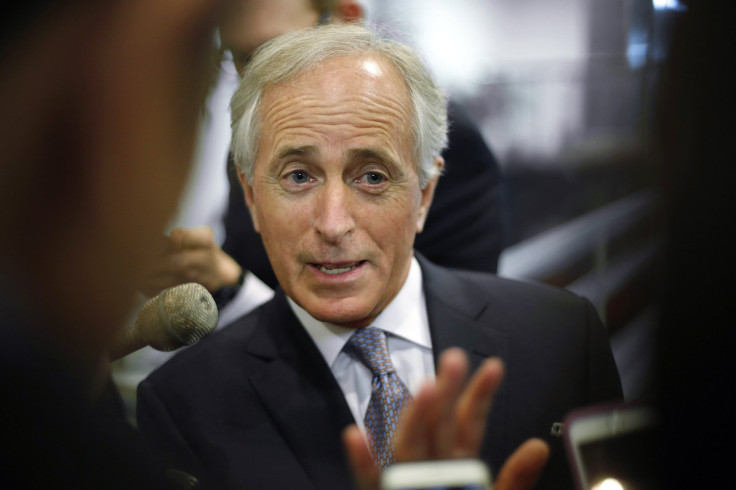Iran: Republicans Blast Obama Nuclear Deal As 'Dangerous' And 'Naive'

WASHINGTON -- Congressional Republicans, who were vocal opponents of negotiations with Tehran before a deal was even struck, quickly pounced on the announcement Thursday of an agreement between Iran, the United States and five additional world powers. Republicans called for congressional approval before the deal, which aims to curb Iran's ability to develop a nuclear weapon, is allowed to move forward.
"There is no nuclear deal or framework with Iran; there is only a list of dangerous U.S. concessions that will put Iran on the path to nuclear weapons," Sen. Tom Cotton, R-Ark., said in a statement. "These concessions also do nothing to stop or challenge Iran’s outlaw behavior. Iran remains the world’s worst state sponsor of terrorism. Iranian aggression is destabilizing the Middle East. And Iran continues to hold multiple Americans hostage."
It's not yet clear what Congress could do to invalidate the agreement -- the likely goal if Republicans seek to impose oversight. As long as President Barack Obama is in the White House, they will need a veto-proof majority in both chambers in order to override a likely veto. There are Democrats who have expressed apprehension about the deal, which means Republicans might be able to scrounge up enough support to undo Obama’s agreement.
Republicans have argued that Iran won’t stick to a deal and any agreement that allows them to continue to enrich uranium will imperil America's allies in the area. House Speaker John Boehner invited Israeli Prime Minister Benjamin Netanyahu to address a joint session of Congress about what he sees as the dangers of a deal with Iran -- a move by the Republican leader that was criticized as a violation of protocol in direct opposition to the White House.
Boehner cited the security of Israel -- which he visited this week -- in criticizing the deal. "After visiting with our partners on the ground in the Middle East this week, my concerns about Iran’s efforts to foment unrest, brutal violence and terror have only grown," Boehner said. "It would be naive to suggest the Iranian regime will not continue to use its nuclear program, and any economic relief, to further destabilize the region."
Congress is out of Washington for its spring break. Members aren’t expected back at the Capitol until April 13. No official action could be taken until they return. Senate Foreign Relations Committee Chairman Sen. Bob Corker, R-Tenn., previously announced a committee vote to be held April 14 on legislation that would require congressional approval of the deal.
“A nuclear-armed Iran would lead to a less safe and less secure world, which is why the stakes are so high in the pursuit of a strong agreement that is fully enforceable, verifiable and is in our national security interests,” Corker said in response to the announcement. “Rather than bypass Congress and head straight to the U.N. Security Council as planned, the administration first should seek the input of the American people. There is growing bipartisan support for congressional review of the nuclear deal, and I am confident of a strong vote on the Iran Nuclear Agreement Review Act when the Senate Foreign Relations Committee takes it up on April 14.”
Corker likely has an ally in Democratic Sen. Bob Menendez of New Jersey, who temporarily stepped down as the top Democrat on the Foreign Relations Committee after he was indicted this week on federal corruption charges. Menendez has been an opponent of Obama's efforts to use diplomacy with Iran and Cuba. "If diplomats can negotiate for two years on this issue, then certainly Congress is entitled to a review period of an agreement that will fundamentally alter our relationship with Iran and the sanctions imposed by Congress," Menendez said in a statement.
Republicans have been outspoken in their opposition to any talks with Tehran. Cotton organized a letter signed by 47 GOP members warning Iran’s leaders that Congress could scuttle any deal.
Sen. Ron Johnson, R-Wis., echoed the calls for more congressional oversight. “If President Obama truly believes that this ‘framework’ for a deal will prevent Iran from getting a nuclear weapon, he ought to be able to conclusively prove it to Congress and, more importantly, to the American people," Johnson said. "He should present that evidence and allow the American people to have a say through their elected representatives as to whether or not he is correct. If he is confident that this deal lives up to its billing, he should submit the final deal to the Senate for ratification. I will be either introducing or supporting legislation that will require Senate ratification.”
Obama made clear in announcing the deal that he expected a partisan fight. "The issues at stake here are bigger than politics," Obama said. He warned that if the deal is unraveled by congressional Republicans, “it’s the United States that will be blamed for the failure of international diplomacy.”
Obama quoted former President Richard Nixon and echoed the GOP's revered President Ronald Reagan to bolster his policy. “This deal is not based on trust, it’s based on unprecedented verification,” Obama said. He also emphasized that those Republican presidents had been willing to make deals with the Soviet Union, a far more fearsome enemy of the U.S. than Iran is, at the height of the Cold War.
© Copyright IBTimes 2024. All rights reserved.






















